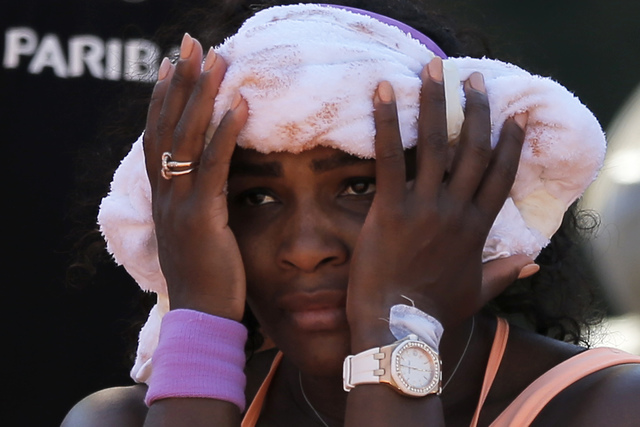PARIS — At changeovers in her French Open semifinal, an ill Serena Williams walked ever so slowly to the sideline, where even lowering herself to sit seemed difficult. ADVERTISING PARIS — At changeovers in her French Open semifinal, an ill
PARIS — At changeovers in her French Open semifinal, an ill Serena Williams walked ever so slowly to the sideline, where even lowering herself to sit seemed difficult.
With the temperature nearing 85 degrees (30 Celsius), she pressed white towels filled with ice against her forehead and neck and guzzled water.
Early on, her play was as poor as her health. She failed to chase balls she normally would. As telling as anything: On those occasions when she did win points, Williams mostly refrained from her familiar fist pumps and yells of “Come on!”
Never can count her out, though, no matter the circumstances. Down a set and a break Thursday, and clearly not herself, Williams summoned the resolve to reach the final by beating 23rd-seeded Timea Bacsinszky of Switzerland 4-6, 6-3, 6-0.
After getting broken to fall behind 3-2 in the second set, Williams claimed the final 10 games. She had a 12-2 edge in winners in the final set.
“Stunning,” said Williams’ coach, Patrick Mouratoglou. “This is the difference between champions and everyone else. There is no logical explanation.”
Mouratoglou said the No. 1-ranked Williams has been dealing for several days with the flu, including a fever and difficulty breathing.
Williams skipped her news conference — something sister Venus did after losing last week, drawing a $3,000 fine — and issued a statement reading: “I have been feeling unwell for a few days, and … I needed to see the tournament doctor.”
Now one victory from her third French Open championship and 20th major title in all, Williams faces 13th-seeded Lucie Safarova of the Czech Republic on Saturday.
“I tried everything. I thought if I lose, I will lose with a fight,” Williams told crowd in French. “I tried, I tried. I found the energy. I don’t know where, but I found it. And I won. I hope that on Saturday, I hope …”
Cutting herself off, she stepped away from the microphone, bent over and began coughing. She offered a quick wave, collected her things and left. Off the court, she got a hug from Mouratoglou, who helped her down stairs toward the locker room.
“I was worried,” said Williams’ mother, Oracene Price. “But I knew if she could get through the second set, somehow maybe the adrenaline and God would help her get through the match.”
Next comes Williams’ 24th Grand Slam final, and Safarova’s first. In her statement, Williams called herself “determined to be 100 percent ready.”
The left-handed Safarova eliminated defending champion Maria Sharapova in the fourth round and 2008 champion Ana Ivanovic 7-5, 7-5 on Thursday.
Williams won her semifinal despite dropping the first set for the fourth time in six matches. She’d never fashioned that many comebacks during one major tournament.
When this one was over, finally over, Williams leaned forward and rested her head on her hands atop the handle of her upside-down racket.
Bacsinszky — who said she noticed Williams “was taking some time between points” but tried to focus on herself — was asked how her own mistakes contributed to the result.
“We say in French: ‘If we could put Paris in a bottle.’ Like, I could say, ‘If, if, if. If my forehand was in. If I would maybe choose another tactic,’” Bacsinszky said.
Bacsinszky wiped away tears as she left the court, her magical run abruptly done. She never had been past the second round in Paris — or the third round at any major.
Two years ago, she took a hiatus from tennis to work at restaurants with an eye toward pursuing a degree in hotel management. Last year, she was ranked 112th and went through qualifying at the French Open.
This year, equipped with a dangerous backhand and an affinity for drop shots, Bacsinszky beat two-time Wimbledon champion Petra Kvitova in the fourth round and lost a tournament-low 33 games entering Thursday. She was 7-0 in her French Open career when taking the first set.
Ah, but none of those matches came against Williams.
When the going gets toughest, no one is better than Williams at the moment — and, perhaps, in the history of the game. In 2015, she is 31-1, including 11-0 in three-setters.
If she defeats Safarova, the 33-year-old American would add to her 2002 and 2013 French Open titles and collect a third consecutive major championship.
“She never thought about withdrawing,” Mouratoglou said. “Even on one leg, she will step on court. She always believes that she can pull through. This is her strength. You can’t take it away from her.”



